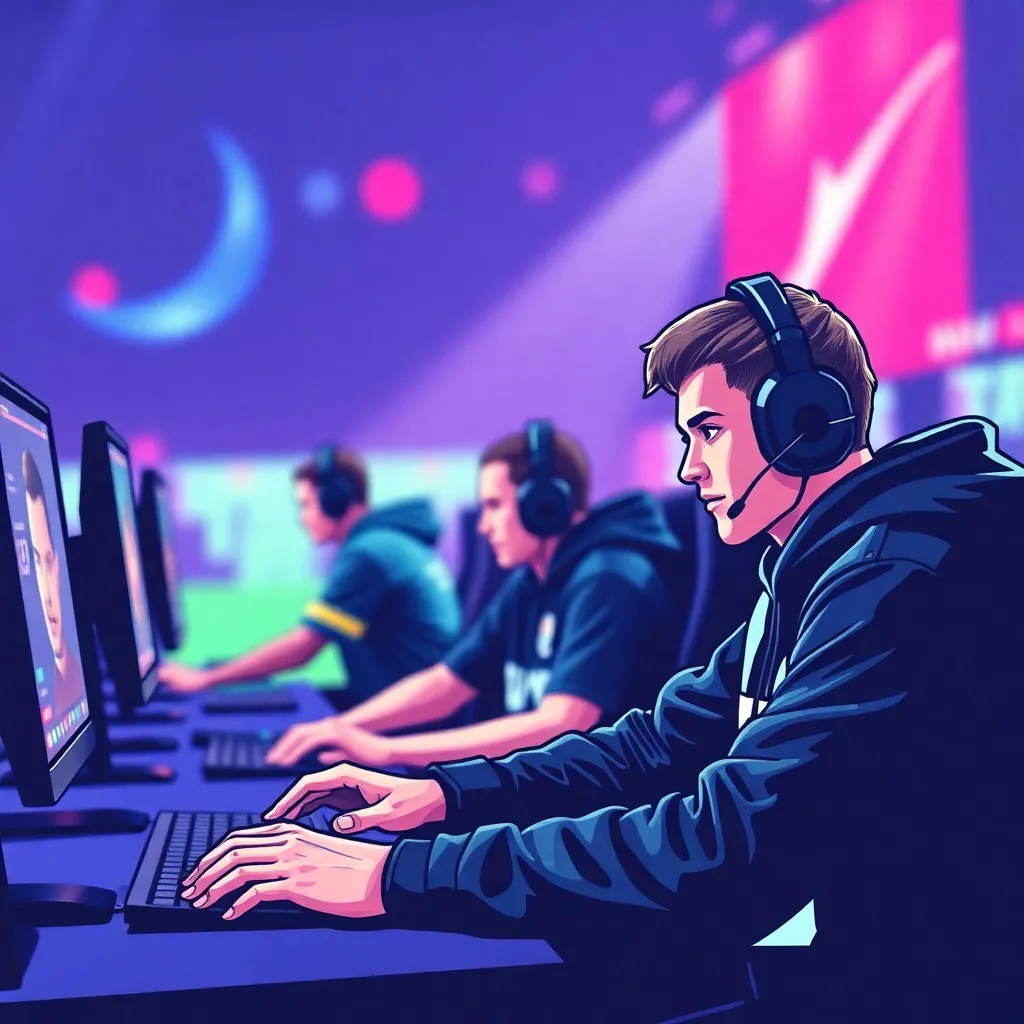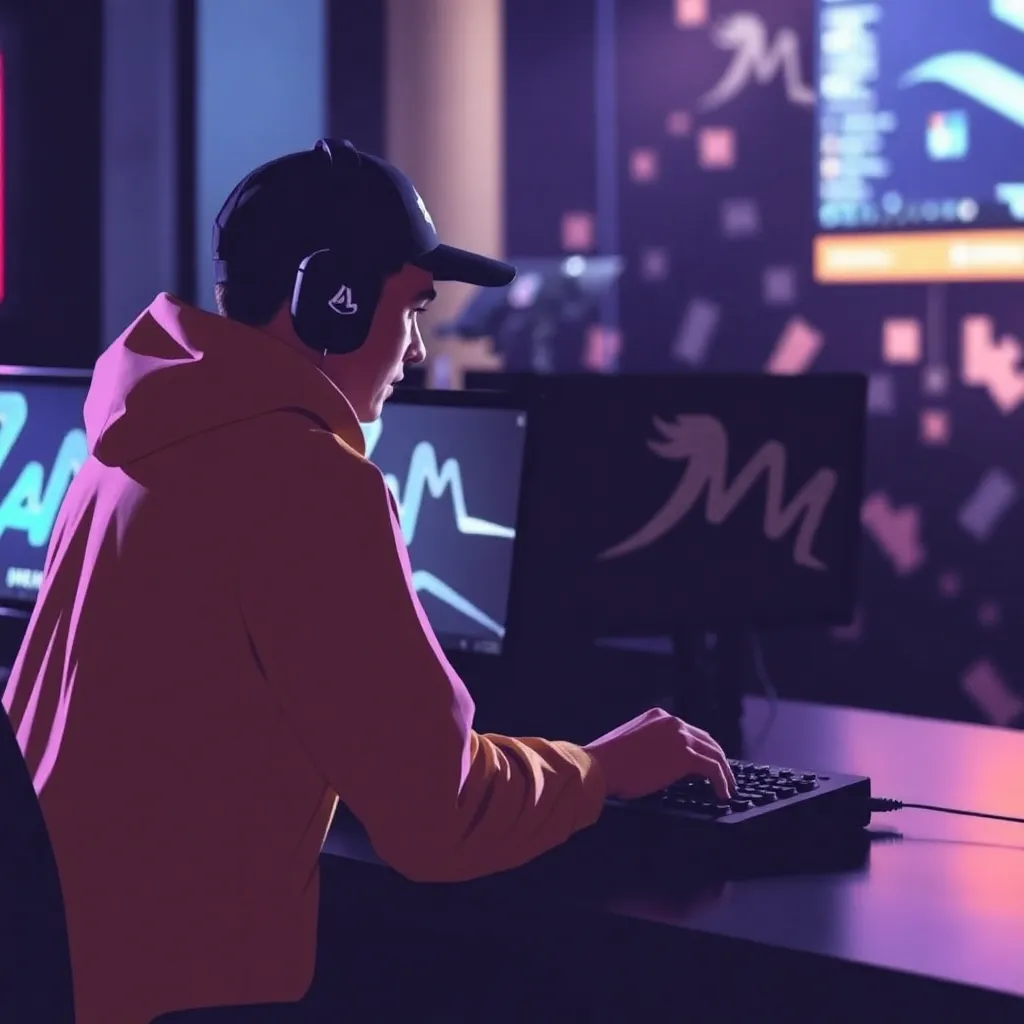The role of AI in video game innovation has not gone unnoticed amid the rapid changes in this world of games. Hardly any genre in more striking manifestations is better than first-person shooter (FPS) games, building on fast action, strategic gameplay, and razor-sharp reflexes. Thus, as technology advances, AI assumes its role in competitive games and esports and further evolves the way we play, watch, and engage in them.
By 2030, AI should transform the mechanics of first-person shooters and its structure in competitive gameplay, training methods, and the esports ecosystem. This article represents an overview of how advanced AI might reshape FPS games, its influence on competitive gameplay, and the potential changes it will bring to the esports industry over the next decade.

Current Role of AI in First-Person Shooter Games
Before we go on to the prospects, it will also be helpful to understand first the current usage of AI for first-person shooter games. AI has been traditionally implemented in two major areas: as non-player characters (NPCs) and in-game matching systems.
1. AI as NPCs and Enemies
Most FPS games are controlled by AI, which commands the actions of enemies and NPCs. These AI opponents are made to operate in some manner of routine, and they can discern player movements, dodge attacks, and then counter-strategize. Current AI opponents can create some healthy challenges but fail to remain adaptable in unpredictable situations because they tend to script most of their actions.
2. Artificial Intelligence in the Matchmaking Systems
Another important part AI plays is in the matchmaking algorithm for FPS games. It makes sure players of equal skill levels are matched together so that one does not get robbed of a perfectly balanced competitive experience. The system considers past performance, win/loss ratios, and some in-game statistics to come up with fair matchups.
It is improving but still has its limitations. For example, it may be difficult for the systems currently to predict the skill ceilings of players or their future performance in terms of certain play styles that continue to change. As AI improves, so do these systems and continue improving experience in multiplayer matches.
The Future of AI: What’s Next by 2030?
By 2030, AI in first-person shooter games is going to be way past what we have with NPCs and matchmaking. It is going to fundamentally change gameplay, development, and experience.
Gameplay, game development, and even the esports industry will change because of this evolution.
1. Adaptive Gameplay Powered by AI
Adaptive gameplay is one of the most awaited innovations for AI. By 2030, AI in FPS games will have learned to be able to adapt and evolve in real time based on player behavior. No longer confined by scripted patterns, AI enemies might learn and adjust their strategies based on what the player has done or what he’s planning to do next, hence offering a personalized and dynamic challenge.
Imagine an FPS with an AI enemy that learns your favorite strategies – no matter whether you camp in a corner, rush in aggressively to meet the next action or anything in between. This means players will have to change tactics constantly to counter the training, which will make the game more interesting and less predictable.
2. Training the AI for the Competitive Players
Advanced AI would also alter training methods for aspiring esports players and professional gamers. AI-powered tools might make it possible for video game footage to be analyzed for weaknesses and provide personalized advice on how to strengthen skills through such coaches. These AI coaches could monitor everything from aiming precision to map awareness and detailed feedback on how to refine gameplay.
By 2030, AI-based training programs will probably be as diverse as the needs of beginners and veterans. Competitive gamers will utilize these training programs to simulate high-pressure scenarios or to practice advanced strategies and perhaps learn to counter a specific opponent.
3. Procedural Generation of Content
The impact of the integration of AI into the game development process is that it will allow for much more dynamic and procedurally generated content in FPS, including unique maps, missions, or scenarios coming together within a split second, therefore providing endless variations of gameplay. Players playing the same map over again may experience different layouts, placement of enemies, and objectives each time they play.
This procedural generation can also be extended to competitive esports. One can imagine the future wherein in tournaments, no two matches played on the same map are allowed which forces teams to rely on strategies and adaptability rather than memory. AI can randomize elements such as terrain, cover, and spawn points for every game to feel different.
Impact on Competitive Gameplay and Esports
Advanced AI integration into first-person shooters will revolutionize competitive gaming and esports by 2030. This will change the kind of skill required for success; how people prepare for competition, organize, and broadcast tournaments will also change.
1. Increasing the Skill Ceiling
Accordingly, with the growing flexibility and unpredictable nature of AI, the skill top in FPS games will not but grow with it; after all, memorized patterns or even scripted enemy behavior is just not enough to win the game for the player. Rather, it’s only by making all strategies more complex, reflexes faster, and adaptability better that a gamer will be able to outplay AI-powerful opponents.
This only makes competitive players rise to even newer heights, making a difference between the truly best and average players. When considering the esports world, such may lead to more thrilling and unpredictable matches, given that professional players will have to adapt and modify their tactics permanently to gain the game’s upper hand.
2. AI as Opponents in Esports Tournaments
Perhaps one of the most interesting possibilities is the use of AI competitors in tournaments of esports. By 2030, it might be conceivable that AI has grown enough to compete as a contender in top esports events. In terms of AI-powered teams battling against human players, new challenges for human players might open up to new heights of performance.
These AI opponents would not be simple bots-for instance, they could repeat the play styles of the best human players or even discover they’re own based on deep learning algorithms. Perhaps this could represent an entirely new kind of competition where humans and AI fought for supremacy with equality.
3. AI in the Preparation and Strategy of Tournaments
AI will also be crucial in the preparation for any tournament or strategy. Teams could use AI tools to analyze opponents and conduct simulations of how different strategies would play out if deployed in a real match. With AI-driven analytics, everything from weapon accuracy to positioning will break down and thus make teams improve their tactics before stepping onto the virtual battlefield.
In the practice environment, AI can be used to simulate the strengths and weaknesses of specific opponents. It can help esports players learn more about their potential opponents and improve strategies for competing against them.
AI’s Function in Shaping the Esports Broadcasting Future
AI will not only influence how players play the FPS game but also influence how esports tournaments are enjoyed and broadcast by viewers. By 2030, we can expect AI to take a comprehensive role in enhancing spectator experience, making esports more interesting and accessible to global viewers.
1. AI-enriched commentary and Analysis
Live broadcasting might see the incorporation of AI to offer real-time commentaries and analysis of the matches. Advanced AI systems would, in real-time, provide real insight into games, giving better details into individual players’ decisions and strategies as well as identifying key moments that even human commentators may miss. This results in commentary that is much more detailed, or evidence-based, enriching the viewer’s experience.
In addition, AI-powered analysis tools might break down complex plays and strategies with detailed visualizations so that viewers – well, not just enthusiastic fans but spectators who are unfamiliar with the game – can understand the action unfolding before them. This is yet another way AI can bring esports into the mainstream and fuel industry growth.
2. Personalized Viewing Experience
With increasing popularity in esports, there will be more personalized viewing due to AI. It could be foreseen that by 2030, AI algorithms will be able to evaluate viewer preferences and thus enable tailored broadcasts based on favorite players, teams, or in-game events. For instance, a viewer may want to watch sniper gameplay. AI will be able to curate a broadcast containing moments of sniping during the match.
Moreover, AI can be used to produce personalized match highlights that will help fans relive their favorite moments, see plays they may have missed, and so many other things. This would heighten the engagement and immersion of the esports fan experience.
Ethical Issues and Problems in the Implementation of AI
Yes, in a very positive light, AI can be integrated into first-person shooter games, adding much to the benefits of esports; however, this technology also raises important ethical issues, among them being the challenges that have to be addressed.
1. AI Cheating and Exploitation
With advancements in AI, the potential for its use in cheating comes along with it as a very serious issue. AI bots can be designed to play on behalf of gamers; especially using machine learning algorithms to achieve near-perfect accuracy and reaction times in game. The outcome in such terms would accordingly imply that the players are gaining unfair advantages in competitive matches, hence undermining the integrity of esports tournaments.
The AI bots will, therefore, compel developers and organizers of tournaments to make tighter checks to ensure no AI bots can be used during online and competitive play.
2. Balancing AI and Human Skill
Another factor is the balance between artificial and human players in competitive game scenarios. When AI becomes too powerful or too unpredictable, it tends to dominate the skills of humans and frustrates players with the results. This developer for this game must tread that fine line to ensure that AI can challenge the player but not appear impossibly difficult or completely unplayable.
Conclusion
The future of first-person shooter games will be revolutionized by 2030 with AI’s advanced infusion in competitive gameplay and esports. Adaptive enemies enabled by AI will mean advanced AI-powered tournament preparation and broadcasting through personalized training tools. The future will be much more dynamic, unpredictable, and engaging regarding FPS games. Simultaneously, AI cheating and balance issues will require immediate solutions.
A future to eagerly await will be a bright new view for competitors and fans alike – a new reality for competitive gaming challenging the possible in esports. By 2030, AI will no longer be used to improve gameplay but instead be a part of the ecosystem of competitive first-person shooters.

